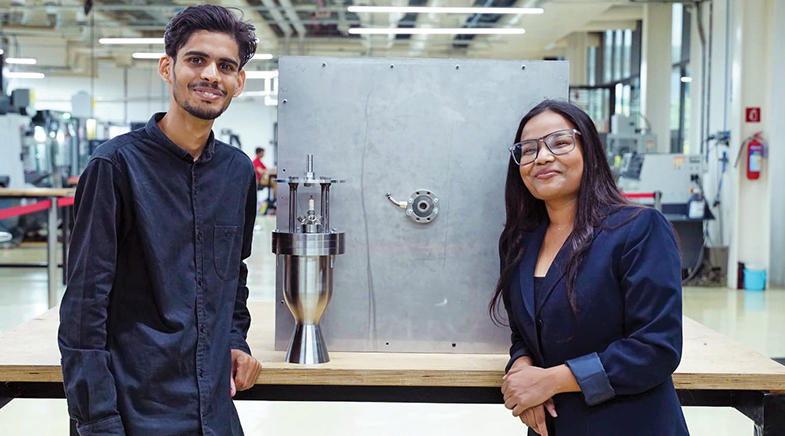Cleaning up faulty proteins
-
- from Shaastra :: vol 04 issue 04 :: May 2025

A nanoform of vitamin C can restore impaired autophagy in brain cells.
Human cells have an auto-clearing system which finds harmful proteins or protein aggregates and clears them by breaking them down and recycling them. When such autophagy doesn't work, it leads to a build-up of toxic proteins, causing cancer, neurodegenerative diseases and metabolic disorders. Now, researchers from the Indian Institute of Technology (IIT) Kharagpur have shown that nanoascorbates (a nanoform of vitamin C) can facilitate the clearance of faulty proteins in brain cells in the neurodegenerative Huntington's disease by restoring impaired autophagy.
Huntington's disease is a genetic disorder where an excess of glutamine amino acid repeats in Huntington's protein, leading to a misfolded protein. This faulty protein aggregates in brain cells and damages them over time. The disease starts with subtle signs such as mood swings and clumsiness and, over time, leads to an inability to walk or talk and, ultimately, death. The disease cannot be treated; medications are given to manage its symptoms.
"During Huntington's disease, toxic protein aggregates and dysfunctional autophagy are at loggerheads, and the race is on to identify mechanisms to restore the autophagy function that can clear these aggregates," says Ravi Manjithaya, Professor at the Bengaluru-based Jawaharlal Nehru Centre for Advanced Scientific Research (JNCASR). Manjithaya, an expert in the field of autophagy, is not associated with the study.
The team reports that 90% of faulty Huntington's protein was cleared when it was incubated with a 15-micromolar concentration of nanoascorbate.
Scientists across the globe have tested various molecules that can restore impaired autophagy to treat neurodegenerative disorders, but these synthetic molecules pose a risk of toxicity. Nibedita Pradhan, the Principal Investigator of the study and former postdoctoral fellow at IIT Kharagpur, decided to test vitamin C. "Ascorbate or vitamin C is extremely safe because it is the most abundant antioxidant in our central nervous system," says Pradhan, currently Assistant Professor at the Bengaluru-based Ramaiah College of Arts, Science & Commerce. As vitamin C is chemically unstable, Pradhan used a polymeric nanoform. More stable, it penetrates cells easily and is easily absorbed.
In their research paper published in ACS Applied Nano Materials (bit.ly/nanoascorbate), the team reports that 90% of faulty Huntington's protein was cleared when it was incubated with a 15-micromolar concentration of nanoascorbate for three hours. It reported that when a transgenic fruit fly with Huntington's disease was given nanoascorbate, it improved motor activity and increased lifespan.
Pradhan is also planning to test whether nanoascorbate can clear protein aggregates in other neurodegenerative diseases such as Alzheimer's, Parkinson's and Amyotrophic Lateral Sclerosis.
Have a
story idea?
Tell us.
Do you have a recent research paper or an idea for a science/technology-themed article that you'd like to tell us about?
GET IN TOUCH














